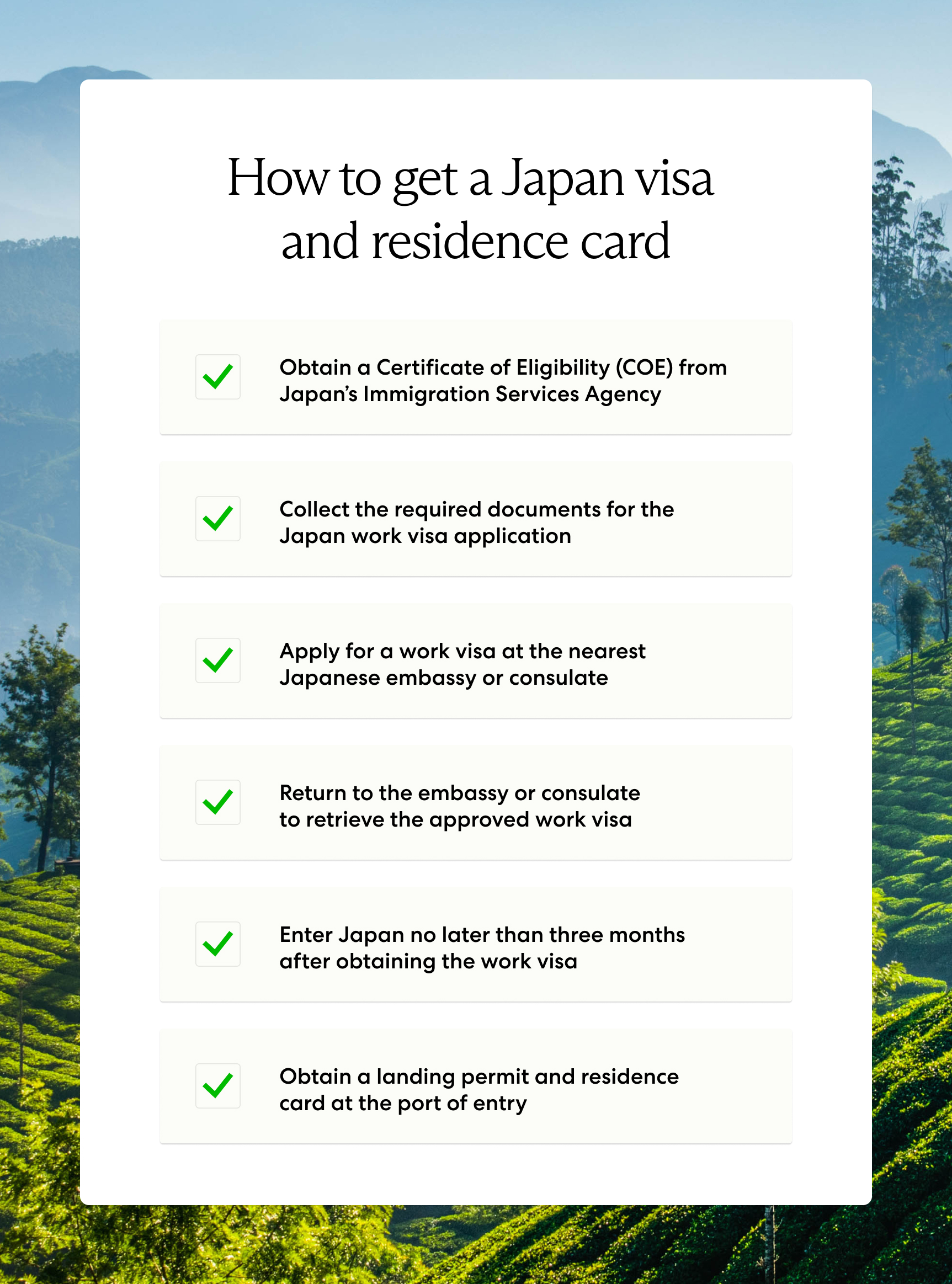The Japanese government offers a variety of visas to attract skilled foreign talent, and many international businesses with offices in Japan regularly seek foreign talent to fill open positions.
However, the complicated process of navigating the various visa categories in Japan, selecting the proper visa, and applying often turns global companies and expats away.
In this guide, we compare Japan’s work visas, list the required documents for applying, and provide key steps for obtaining a work visa. We also outline how working with an immigration expert streamlines the process for global companies looking to hire or relocate talent in Japan.
Types of Japan work visas
The three main types of Japanese work visas include a standard Work Visa for Occupations and two Specified Skills Visas. We outline each one in detail below.
Work visa for occupations
The Work Visa for Occupations is the standard Japanese work visa. It’s available for a variety of professions, including:
- Professors
- Artists
- Religious activity
- Journalism
- Medical services
- Engineers
- Humanities specialists
- Entertainers
This visa allows expats, or foreign nationals, to work in Japan from three months to five years, depending on the role and individual circumstances.
Specified Skills Visa 1-SSV1
The Japanese government designed the Specified Skills Worker Visa 1-SSV1 to attract highly specialized foreign talent ready to work in specific labor sectors without prior training, such as in construction, aviation, or agriculture.
The primary advantage of the SSV1 visa is the generous support system it offers to its holders. This system assists foreign nationals with relocation matters, such as renting a house, opening a bank account, and signing a mobile phone contract upon arrival.
Applicants must pass a point-based skill standards exam and a language test proving they have an N4 level of Japanese proficiency. The visa is valid for four months to one year and is renewable for up to five years.
Specified Skills Visa 2-SSV2
The SSV2 visa is similar to the SSV1. However, the application process for the SSV2 requires a higher level of specialization and proper certification.
Employees with this visa can bring their immediate family members to Japan and renew their visa indefinitely until they choose to apply for Japanese residency.
Requirements for obtaining a Japan work visa
Japan’s work visa requirements vary depending on the visa category. However, below is a general list of the required supporting documents for the application:
- Certificate of Eligibility
- Application form, completed and signed
- Applicant’s resume
- Valid passport and photocopies
- Passport-sized photos in line with requirements
- Employment agreement detailing the employee’s position, salary, and work duration
- Academic and professional certificates
- Employer documents, such as the company’s registry certificate, tax withholding report, and recent financial statements
Applicants may also need to provide additional documents upon request from the Japanese embassy or consulate where they apply.
How to get a Japan work visa and residence card: 6 steps
The Japan work visa application process consists of two stages: getting a Certificate of Eligibility and applying for a work visa. We outline the steps below.

1. Obtain a Certificate of Eligibility
The Certificate of Eligibility (COE) is a document that shows the applicant has approval from the Japanese Immigration Services and that they meet the entry requirements for foreign talent. The sponsoring employer must apply for the COE on the employee’s behalf at the relevant Regional Immigration Bureau.
Below is a nonconclusive list of the required supporting documents for the COE application:
- Completed application form
- 4cm x 3cm photograph
- Return mail envelope with paid postage
- Letter of guarantee
When applying for a specified skills visa, the sponsoring employer must also submit the points calculation from a skills exam with a score of 70+ points, indicating the applicant has sufficient skills for the role.
2. Collect the required documents
After receiving the COE, the employer should begin collecting the remaining supporting documents for the visa application. The complete list of documents includes those from the list mentioned above, plus several additional items from the employer, such as:
- Invitation letter
- List of visa applicants
- Detailed itinerary in Japan
3. Apply for a work visa at a nearby Japanese consulate
Applicants may submit their visa application at the nearest Japanese consulate or embassy in one of four ways:
- In-person
- By writing a proxy letter and sending a representative to the Japanese consulate
- Via an accredited travel agent approved by the Japanese consulate
- Via the JAPAN eVISA website
Depending on the circumstances in the foreign national’s home country or region, they may need to submit their documents in person or through an accredited travel agent.
The applicant may also need to return for an interview or provide additional documents at the consulate’s request.
4. Return to the consulate to retrieve the approved work visa
Upon receiving a notification that the visa is approved, the applicant should return to the embassy or consulate to collect their passport and visa.
5. Enter Japan
Upon receiving the visa, the applicant must travel to Japan within three months.
6. Obtain a landing permit and residence card at the airport
Upon arrival at the port of entry in Japan, immigration officers will review the work visa and supporting documents and affix a landing permit to the foreign national’s passport. The landing permit replaces the visa and allows them entry into Japan.
Depending on the airport through which the foreign national enters, they will either receive a residence card upon arrival or have to apply for one at the local municipal office within 14 days of establishing residence in Japan.
The U.S. Embassy in Japan mandates foreign nationals carry their up-to-date residence card with them at all times, as not having it with you violates local law.
Considerations before obtaining a Japan work visa
A unique consideration for global companies interested in hiring foreign talent in Japan is that every international applicant requires sponsorship from a locally incorporated legal entity. This requirement discourages many foreign companies without a local entity in Japan from doing business there.
A simple workaround is to partner with an employer of record (EOR). An EOR is an organization that serves as the legal employer of your global workforce, allowing you to easily reap the benefits of global mobility by hiring or relocating talent abroad without establishing a local entity.
An EOR handles everything from hiring and onboarding to immigration requirements and compliance. This option allows you to test the Japanese market and quickly hire expats or locals without violating Japanese employment and immigration laws.
Learn more: What Is an Employer of Record (EOR)?
Easily hire or relocate talent in Japan with Velocity Global
Obtaining Japanese work visas for distributed teams takes a lot of work. Eliminate the headache by partnering with Velocity Global.
Velocity Global’s integrated Global Immigration solution simplifies visa acquisition for distributed teams in Japan and beyond. As part of our Employer of Record (EOR) solution, we handle document collection, translation, and administration while ensuring compliance with local immigration laws so you can hire or relocate talent worldwide with ease.
Get in touch with Velocity Global today to learn how to simplify global immigration and quickly hire top talent in Japan and beyond.
Japan work visa FAQs
Below are answers to commonly asked questions about Japanese work visas.
What is the cost of obtaining a Japan work visa?
Japanese work visa fees vary depending on the visa type, the applicant’s nationality, and whether it’s a single or multiple-entry visa. A single-entry work visa generally costs about ¥3,000 (US$22), while a multiple-entry visa costs roughly ¥6,000 (US$44).
Applicants only pay the visa fee if the application is approved and must pay it in cash. However, if you apply for an eVISA via the JAPAN eVISA website, online payment by credit card is available for select countries and regions.
How long does a work visa last in Japan?
The validity of a Japanese work visa varies based on the visa type. The standard work visa is valid for three months to five years, depending on the applicant’s profession and individual circumstances.
How can I extend a Japan work visa?
If an employee’s Japanese work contract is still valid, they can renew their work visa at a relevant local immigration office.
If an individual no longer has employment in Japan, they may consider applying for a designated activity visa. This visa allows them to continue job hunting in Japan for six months beyond their current work visa’s expiration date.



